The designs
National 12 designs go back to the 1936 and there have been substantial developments in hull shape, construction methods, materials and rig since then. Typically there has been a paradigm shift every decade or so. There are four main classifications in the fleet; double-bottomed, foilers, admiral's cuppers and vintage. There are often prizes for these different classifications at the major events.Within these classifications there are hundreds of designs. Some of these were particularly popular and are described on the list below. You can read about all the N12 designs on the boat database.
| Year | Design | Picture | Summary . . . Price guide (£=400-1k, ££=1k-2k, £££=2k-4k, ££££ 4k+) |
| 2012 | Hijack |  |
Designed by Dave Hollom and manufactured by Composite Craft, launched mid 2012 and has showed good pace particularly in strong winds. The design won the Burton Cup in 2018 ££££ |
| 2009 | Dead Cat Bounce |  |
Another innovative design from Jo Richards which has proven itself at Burton week since 2009. Jo designed the boat around the rudder foil. It has low free-board and a pronounced bustle in the rear sections of the hull. This would normally generate a large stern wave but with the foil this produces a pack that has low wetted surface area and a small stern wave. ££££ |
| 2008 | Paradigm2 |  |
A development of the experimental Paradigm design by Gavin Willis. The Paradigm 2 has a more conventional rig but still sports a winged rudder and higher side decks than standard. Several production runs were made of this design. £££ |
| 2003 | Paradigm |  |
An experimental design from Gavin Willis. The original included flaps in the bow a aero-foiled foredeck for extra lift. It also sports a winged rudder for better control. |
| 2003 | Paradox |  |
Bim Daser's third in the series which started with the Feeling Foolish. The Paradox has maximum width decks from the shrouds to the transom providing the helm and crew with maximum leverage when hiking giving it more power in a blow. The rounded hull also means the Paradox is easily driven in light airs if care is taken to avoid dunking the wider decks £££ |
| 2001 | Numinous |
 |
Developed from the Feeling Foolish by Bim Daser. The Numinous is a rounded very low drag design which is great in light winds and surprisingly good in restricted waters. Performance in windy conditions is equal to the Feeling Foolish. £££ |
| 2000 | Annie Apple |  |
Annie Apple has been designed to minimise drag (surface and wave making) and maximise righting moment and lift. Designed by Dave Greening & built by Nigel Waller. £££ |
| 1998 | Big Issue |  |
Designed by Phil Morrison with high speed off wind performance in mind. The hull design was influenced by Phil's design work on International 14s. £££ |
| 1995 | Feeling Foolish |
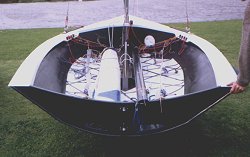 |
Designed in 1995, this design is an excellent all-rounder. The Feeling Foolish has a rounded hull with a small chine which makes it easily driven in light winds whilst maintaining great pace on open waters and has outstanding down wind performance in a blow. Bim describes the Feeling Foolish to Yachts & Yachting ££ |
| 1993 | Wild Front Ear |
 |
A subtle "Vee" hull provides increased speed on the transition to planing, it surfs well. ££ |
| 1991 | Freak out |
 |
A modified Crusader with better planing performance, and a drop-dead-gorgeous figure! The freak out has a low wetted surface area hull so is easily driven in light winds. They also have a wide deck giving them power in a blow. ££ |
| 1989 | Designer soap dish | |
The first "almost self draining" N12 £ |
| 1987 | Radical posture |
Blistering speed in a blow, however its flat rocker and full sections make it hard to sail in light winds £ |
|
| 1987 | Design 8 |
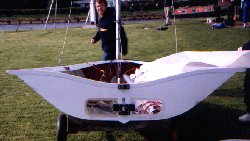 |
A modified Crusader made in "off-the-shelf" GRP. It is a good well behaved all-rounder and performs successfully in all conditions An excellent boat to get started in the class. £ |
| 1987 | Final Chapter |
 |
The Chapter has been campaigned by heavier crews with great success. If you and your crew are over 22 stone this could be the boat for you. In recent years light crews have had good results showing the design isn't just for heavy weights. Also a number of boats have had rudder foils retro-fitted and have proven to be highly competitive. ££ |
| 1981 | Crusader |
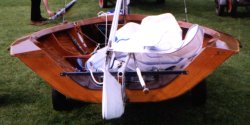 |
A fine all rounder with good sea performance. It has a powerful hull with less rocker than its contemporaries. £ |
| 1981 | Baggy Trousers |
 |
A wide, powerful hull which is at its best on the sea in a breeze. This is very fast on the plane and is not for the faint hearted! £ |
| 1981 | Baggy II |
A Baggy Trousers development with even more speed! If that is possible! £ |
|
| 1980 | Rough Diamond |
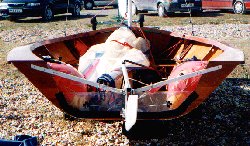 |
Good all rounder with a round bilge giving it an edge in light airs. Now superseded by the Trouble Shooter. £ |
| 1980 | Tigress |
|
Round bilged Tiger, another good all rounder. £ |
| 1979 | Punkarella | |
Punkarella was a one-off boat, which was ahead of its time and paved the way for the wide, fast designs |
| 1979 | Street Legal |
The Street Legal has a very wide hull which is a bit stick and so difficult to make go in light winds, but watch it go in a force 4. £ |
|
| 1978 | Tiger |
|
The Tiger is a modified Cheshire Cat with flatter sections making it faster on the sea. In the right hands they are still seen at the front of the fleet. £ |
| 1977 | Scooter |
A "beamy" four plank development that was produced in GRP and showed lots of promise in the late 70s £ |
|
| 1977 | Bouncer |
 |
Bouncer was a pioneering wide and flat design, still very fast on open water. £ |
| 1976 | Pipedream |
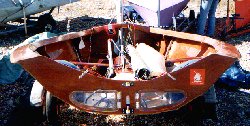 |
You will not be out-pointed with this one. An easily driven hull with very fine bows makes it excellent inland and to windward. £ |
| 1975 | Wind-Fall |
This has an inverted garboard which reduces the wetted area and makes it fast in sub-planing conditions £ | |
| 1973 | Cheshire Cat |
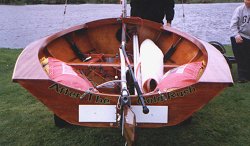 |
The most successful design of the 1970s. Now superseded on the sea, but still a good all round inland boat for restricted waters. £ |
| 1972 | Paper Dart |
|
Indestructible GRP development of the China Doll (1967) and Whisper (1970). Many are still doing well in the hands of club racers. £ |
Vintage
There have been many designs since 1936. Here is a quick summary of some of these clinker boats. Many of the descriptions and pictures come from Robin Steavenson's "History of the National 12s". As this area develops, you should be able to click on the design for more details and pictures. Wherever possible pictures have been credited to their sources. If anyone who has rights to any picture objects to its use here, please let us know, and we will remove it, or credit it more formally.
| Year | Design | Mug shot | Description |
| 1970 | Whisper |  |
Won the Nationals in 1970. Designer: Phil Morrison |
| 1967 | China Doll |  |
Phil Morrison's first National 12. The last clinker boat was number 3009, a China Doll. Designer: Phil Morrison |
| 1967 | Mr Jones |  |
Flaring out to a maximum beam of approx. 6'3" combined with a fine entry, narrow transom and relatively flat rocker, the design had a reputation for being difficult to sail, with the helm regularly being washed out the back on a fast plane by the stern wave! |
| 1966 | Mark XIIII | Proctor's last 12 design, a further development of the Mk12. Designer: Ian Proctor | |
| 1965 | Lucky Number |  |
Sharp bows, flat aft run, and flared out to maximum allowed beam of 5 ft 11½ in. Designer: Patrick Pym |
| 1964 | Mark XII |  |
A cross between a Mk8 and a Mk11, with reduced waterline beam. Some were built without decking. Designer: Ian Proctor |
| 1962 | Mark XI & XIa | A shallower hull than earlier Proctor designs, with a more even keel rocker. Designer: Ian Proctor | |
| 1962 | March Hare |  |
An almost hard chine design with very sharp bilges. Very slim bows and very flat aft, giving a good planing platform, but also reduced wetted area when heeled in light winds. Designer: Mike Jackson |
| 1962 | Finesse | A powerful hull with high bilges, and with the mast & centreboard further aft than usual. Designer: David Mathias | |
| 1962 | Sparklet |  |
Similar to the Smuggler, but designed to reduce wetted area and improve light wind performance. Cost £190 at the 1962 Boat Show! Designer: Leslie Landamore |
| 1961 | Starfish |  |
A wide dinghy with fine bows and a long, flat run aft Designer: Mike Noakes |
| 1960 | Mark X |  |
Development of the Mk8, with slightly flatter sections and wider bilges. Designer: Ian Proctor |
| 1959 | Squid |  |
Fine entry, flat floors and a fairly hard bilge, with less rocker than contemporary designs. Designer: Richard Rouse |
| 1959 | Smuggler |  |
Fine entry, flat floors and a wide veed transom. Designer: Uffa Fox |
| 1959 | Mark IX | More rounded sections than the Mk8, making a more buoyant but less stable boat. An excellent light wind and river boat. Designer: Ian Proctor | |
| 1957 | Mark VIII |  |
Fine bowed, deep chested and with a straight, wide aft run. |
| 1957 | Mark VII | Never built. Designer: Ian Proctor | |
| 1954 | Chimp | Chimp series had a more powerful hull than the contemporary Proctor designs Designer: Jack Holt | |
| 1956 | Mark VI |  |
Similar to the Mk2 below water, but more flared above to increase beam and sitting out power, good inland. |
| 1954 | Mark V | Designed to carry weight, more V sectioned with more rocker than the IVs. Good inland, but hairy in high winds. | |
| 1954 | Sunrise | Finer entry & shoulders than the Sunshine. | |
| 1954 | Mark IV & IVa | Finer bows to improve windward performance in waves, and wider with more flared topsides. Self bailers allowed the IVa to have a lower freeboard. | |
| 1953 | Mark III | Flatter floors and more topside flare than the MK2. | |
| 1952 | Daphne | Stable, flat floored boat, with wide spray deflecting gunwales. | |
| 1952 | Mark II |  |
More freeboard and a flatter aft run than the Mk1. The first three glued plywood clinker boats were Wyche & Coppock Mk2s, including N1153 owned by Robin Steavenson. |
| 1951 | Mark I | Narrow bows, fuller & flatter mid & aft sections, a good all round dinghy. | |
| 1950 | Little John | Full bows, with a flat, wide rear run good for planing. Good on smooth water, slower in waves. | |
| 1947 | Fillet | Experimental glued clinker boat using thin pine planking. | |
| 1947 | Gnome |  |
Designed for rivers, with a narrow U shape hull and lots of keel rocker. |
| 1947 | Morgan Giles | A wide, wedge shape dinghy, with a very wide transom. | |
| 1946 | 500 series |  |
(Other Holt designs), Designed for the Thames, but a good all-rounder, with a wide transom. |
| 1939 | Sunshine | Wider, with less keel rocker, a narrow bow and flatter mid & rear sections, this design was still able to win the Burton Cup in 1952. | |
| 1938 | Wrath |  |
More stable, flatter floored & less V sectioned, more ready to plane. |
| 1936 | Uffa King |  |
N1 (link to N1 page). The original, with a narrow V section hull. N1 is now in the ISCA Maritime Museum at Oulton Broad, Lowestoft. |
